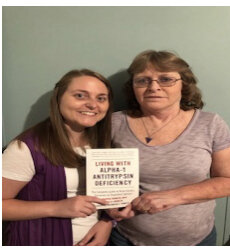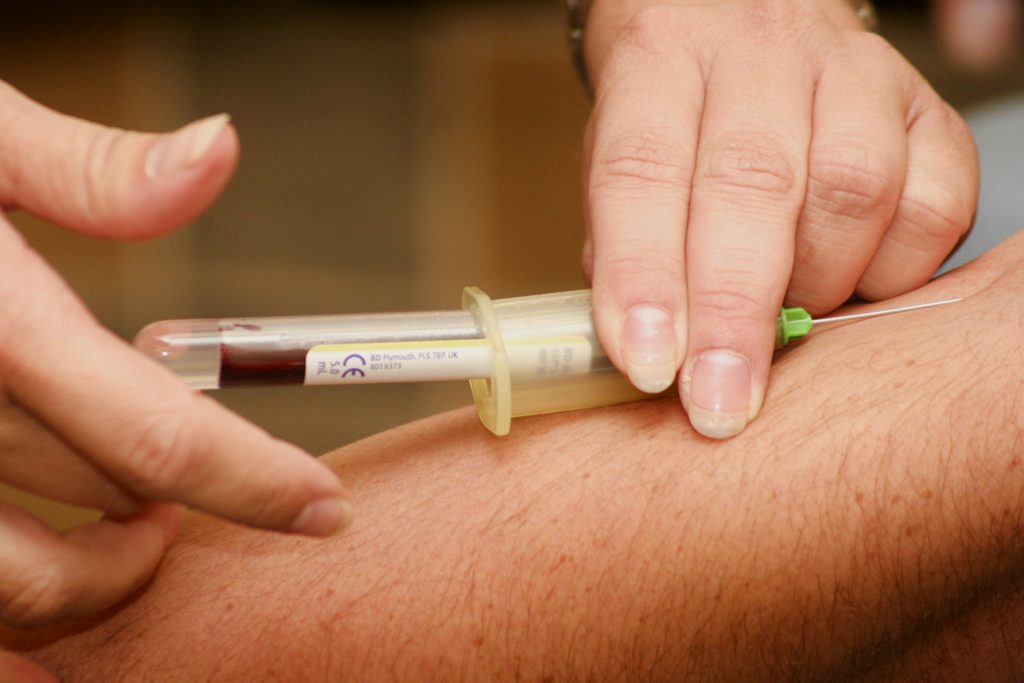By Samantha Bowick
Alpha-1 Antitrypsin Deficiency occurs when the liver doesn’t release enough alpha-1 antitrypsin protein, which helps the lungs and liver function properly. About 100,000 people in the United States suffer with this illness. Symptoms include shortness of breath, chronic respiratory infections, decrease in oxygen saturation, and a large decrease in lung function in a short amount of time. Smoking quickens the onset of symptoms. Those who are not smokers or have stopped smoking for at least six months may be able to have a liver or lung transplants.
My mom (Marie Bowick) has alpha-1 antitrypsin deficiency. From 2007-2008, she lost a lot of lung function in a short amount of time. She was already on inhalers for shortness of breath and they weren’t helping like they should have been. Because of this, her pulmonologist decided to do a blood test for alpha-1 antitrypsin deficiency. The blood test came back and showed that she has alpha-1 antitrypsin deficiency. Soon after being diagnosed, she applied for disability.
Since being diagnosed, my mom’s life has changed and is different than how she imagined it would be at this point in her life. She is unable to work and has been on disability for about 10 years. Before she was on disability she worked as a stocker and in manufacturing. She has been hospitalized three times from 2016-2017 related to alpha-1 antitrypsin deficiency, respiratory infections, and chronic obstructive pulmonary disease (COPD). She is no longer able to do things she once loved like yard work, taking care of our pool, and going to the beach. This in turn affects her mental health. Her lung function is in the 20% requiring her to be on supplemental oxygen since 2012. She now has to take oxygen tanks anywhere she goes.
I (Samantha) am an alpha-1 antitrypsin deficiency carrier. When my mom was first hospitalized, I decided to get tested to see what my alpha-1 antitrypsin protein levels were. I knew that I would be a carrier because we already knew my mom was a ZZ and my dad was tested shortly after my mom and is a MM (he doesn’t have any genes for alpha-1 antitrypsin deficiency). This meant I had to be a MZ carrier, but we didn’t know my protein levels. My mom’s pulmonologist tested me and my results came back that my protein level was in the 60s. The normal range starts at around 100mg/dL. (The alpha-1 antitrypsin deficiency test is free.)
In the last five years regarding my lung and liver function, I was prescribed an inhaler when I lived on the third floor of an apartment building because I would get short of breath. About three years ago, I found out I have a lesion on my liver. I have had a chest X-ray, which was clear, and a lung function test that showed my lung function is about 94%.
Unfortunately, there isn’t a lot of information known about how carriers of alpha-1 antitrypsin deficiency are affected. We aren’t sure if my shortness of breath and liver lesion are from being a carrier, so my pulmonologist is monitoring my symptoms. I have never smoked, so hopefully I won’t ever show any symptoms or decline in liver or lung health.
Find out more by reading Living with Alpha-1 Antitrypsin Deficiency: The Complete Guide to Risk Factors, Symptoms, and Treatment Options

Connect with Samantha Bowick
Website: https://www.samanthabowick.com
Facebook: https://www.facebook.com/samantha.bowick
Samantha Bowick is the author of Living with Alpha-1 Antitrypsin Deficiency: The Complete Guide to Risk Factors, Symptoms, and Treatment Options and Living with Endometriosis: The Complete Guide to Risk Factors, Symptoms, and Treatment Options. She is the Founder of Chronic Illness Support, LLC and the Chronic Illness Support Podcast. Samantha is also a Patient Ambassador with the Chronic Disease Coalition. She wants to use her experiences with her health to help others who are suffering with chronic illnesses.



